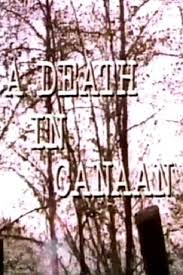
A DEATH IN CANAAN
US, 1978, 125 minutes, Colour.
Paul Clemens, Stephanie Powers, Jacqueline Brooks, Brian Dennehy, Tom Atkins.
Directed by Tony Richardson.
A Death in Canaan is an interesting and moving telemovie. It was directed by English director Tony Richardson (Look Back in Anger, The Entertainer, Tom Jones).
The film is based on a real-life story of a young man accused of murdering his mother. There is travesty of justice in police interrogating the suspect without benefit of lawyer, employing a lie detector and influencing a signed confession. The trial was very severe and the judge put pressure on the jury to reach a decision.
Paul Clemens is excellent as the suspect. There is a good supporting cast including Stephanie Powers, Jacqueline Brooks and Brian Dennehy. The film shows the people of Canaan supporting the suspect and after a three-year struggle being able to free him.
1. An interesting story? Dramatic impact? Emotional impact? Based on a true story? A piece of '70s Americana?
2. The atmosphere of the '70s, the police, crime, the administration of the law, justice? A critique?
3. The background of Connecticut. the town of Canaan, prisons. courts? The atmosphere of the small American town? The people?
4. The work of Tony Richardson? The English sensibility for this American story? The intensity of feeling?
5. The basic situation: the town, Peter, his mother. their relationship and interaction? His discovery of her? His stunned reaction? The telephone call, the police questions, the reaction of his friends. his not weeping?
6. His response to the situation? The police and their response - the officer and his self-assurance, his having done a course on interrogations, his literal application of what he had learnt, trying to establish an atmosphere of trust, persuading Peter, suggesting ideas, suggesting guilt, making him rely on him? The police keeping Peter waiting for hours, his being tired, his not being given his rights, no lawyer? His susceptibility to suggestion, his believing that he might have killed his mother and not remembered it, his dependence on the police, the officer being a father-figure to him? Their persuading him that he had done the murder? His experience with the administrator of the lie detector. his accepting all the explanations, the discussions about conscience and guilt, the way lie detectors worked? His beginning to protest? The typist and the confess-ion, his statements that he was unsure (and their not being put on the confession)? His fear of being mentally disturbed?
7. The portrait of Peter: a pleasant young man, young, easily led, susceptible? How plausibly presented was this kind of character? His relationship with his mother? Her reputation? The intrusive questions about her by the police? His friend, his friend's family and their reaction, support? The police critical of his not crying? His sensible approach yet easily influenced? His behaviour at the hearing., the question of bail. his release, his awkwardness at the party celebrating his release. his lack of awareness about his future? His performance in court and his appropriate answers? His grief at the sentence and his speech? The passing of three years? The final court case - and his naive remark about his mother at the end? A persuasive portrait?
8. The picture of the police - fair, critical? Their attitudes, administration of the town. surprised at a murder. over-confident in their handling of it? The interrogation, the techniques, not giving Peter his rights, the use of the lie detector, the secretary typing the confession? The reaction to people's criticisms? To the magazine article? Their answers in court - especially the administrator of the lie detector?
9. Peter's friends, the friendly family, the parents and their support, his friend? Forming groups, the priest (and the celebration of the memorial service at the mother's grave)? The charities, the fairs, the sales, the appeals? People's scepticism? The hiring of the lawyer - and the good intervention by the fellow-prisoner to help Peter? The lawyer and her robust style? The various people in the group continuing to offer their support?
10. The style of support? The real characters helping: Mike Nicholls, William Styron? The anonymous donor of the bail?
11. The lawyer, her skills - but her concern about civil liberties? Her pleas for Peter? Her response to losing the case? Declining to conduct the appeal?
12. Joan, her family, hearing the gossip in the town, being friendly with the family, going to the prison, writing the article, rounding up support, the final interview and the winning of the case?
13. The court procedures: the prosecutor, the attitudes of the judge and his severity, putting pressure on the jury.. the jury (with echoes of Twelve Angry Men) and their discussions and deadlock?
14. A portrait of police work and its inadequacies? The administration of justice and its limitations? The power to the people to rectify unjust situations?